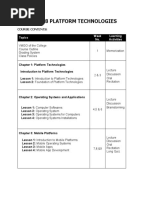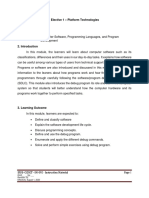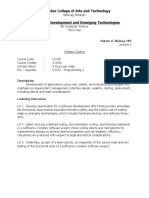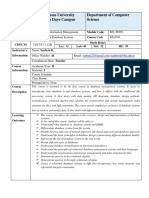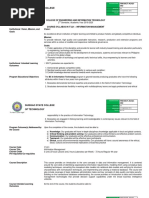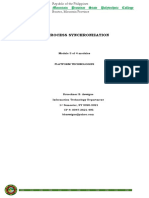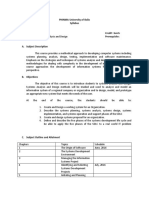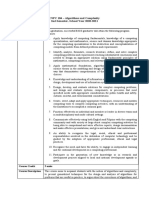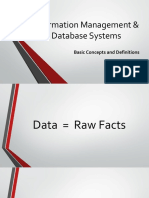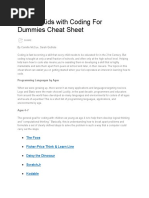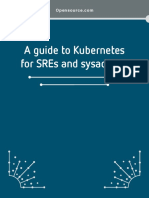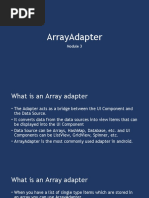Fundamentals of Information Management and Database Systems Syllabus
Fundamentals of Information Management and Database Systems Syllabus
Uploaded by
Anne RosalesCopyright:
Available Formats
Fundamentals of Information Management and Database Systems Syllabus
Fundamentals of Information Management and Database Systems Syllabus
Uploaded by
Anne RosalesOriginal Description:
Copyright
Available Formats
Share this document
Did you find this document useful?
Is this content inappropriate?
Copyright:
Available Formats
Fundamentals of Information Management and Database Systems Syllabus
Fundamentals of Information Management and Database Systems Syllabus
Uploaded by
Anne RosalesCopyright:
Available Formats
College of Computer Studies (CCS)
STANDARDIZED COURSE SYLLABUS
Subject Title Fundamentals of Information Subject Code CC105
Management and Database
Systems
No of Units 2 Units Lecture/1 Unit Lab No of Hrs/Week 5
Subject Type Required Prerequisite Introduction to Computing
Requisite 1. Advance Database Systems
Subject of 2. Object-Oriented and Event-
Driven Programming
Course Description:
The course is a hands-on introduction to information management in general and relational database
management in particular, covering the following topics: the role and function of database
management systems; the relational database model, including relational concepts and relational
query languages; data modeling using the ER model and its conversion into a relational database
schema; and most aspects of the SQL language, including DDL, DML, basic queries, and views.
Learning Outcomes:
By the end of this course, learners should be able to:
LO1: Justify the advantages of a database approach compared to traditional file processing.
LO2: Perform tasks commonly performed by database administrators.
LO3: Design a database based on user requirements using a widely used modeling notation.
LO4: Use Structured Query Language to elicit information.
LO5: Analyze an existing database system with respect to quality issues, reliability, scalability,
efficiency, effectiveness and security.
LO6: Design and implement a small database application.
Course Objectives
• Understand the role of a database management system in an organization.
• Understand basic database concepts, including the structure and operation of the relational
data model.
• Understand and successfully apply logical database design principles, including ER diagrams
and database normalization.
• Use SQL to manipulate or process data efficiently.
• Perform basic Database Administrator’s functions.
• Understand various implementations of database management systems.
• Design and implement a small database project.
Grading System and Truancy Policy
Institutional Quarterly Truancy Policy
Prelim = 20% Prelim
COMTEQ Computer and Developed By: Ver. 1.1
Business College Hasmin D. Cuevas May 2019
Page 1 of 4
Midterm = 20% Lecture A student who incurs absences
Pre-Final = 20% Seatwork = 40% equal to twenty (20) percent of
Final = 40% Quizzes = 60% the required number of Lecture
Laboratory and/or Laboratory hours in a
Course Laboratory Exercises = 100% given class will not be given
Lecture = 50% credit for it and will be given a
Laboratory = 50% Midterm grade of Failure Due to
Lecture Absences (FA).
Seatwork = 40%
Quizzes = 60% The allowable no of absences is:
Laboratory nine (9) for any trice a week; six
Laboratory Exercises = 40% (6) for any twice a week; and
Hands-on Exam = 60% three (3) for once a week
classes.
Pre-Final
Lecture
Seatwork = 40%
Quizzes = 60%
Laboratory
Laboratory Exercises = 40%
Project = 60%
Final
Lecture
Quizzes = 40%
Written Exam = 60%
Laboratory
Hands-on Exam = 40%
Project = 60%
Examinations:
There is only one (1) Written Examination for this course given during the Final quarter, while a
Hands-on/Practical Examination will be given during Midterm and Final.
Topics/Course Contents
Lecture Laboratory
Prelim Prelim
1. Basic Concepts and Definitions 1. Installing and Using MySQL and MySQL
2. File-Based Systems vs The Database Workbench
Approach 2. Database Management
3. Components of the Database
Environment
4. The Relational Database
5. Database Development Process
COMTEQ Computer and Developed By: Ver. 1.1
Business College Hasmin D. Cuevas May 2019
Page 2 of 4
Midterm Midterm
1. Data Modeling 1. Structured Query Language (SQL)
2. Logical Database Design and the
Relational Model
3. Database Normalization
Pre-Final Pre-Final
1. Physical Database Design 1. MySQL Views
2. Data and Database Administration 2. Creating Users and Granting Privileges
3. Creating Physical Data Model
4. Converting Data Model to Actual
Database Using MySQL Workbench
Required Project: Analysis of Business
Case and Design of a Small Database
Project
Final Final
1. Introduction to Database Application Required Project: Construction of
Development Database and a Small Database
Application
References:
1. Khan, R. (2016). The Dummies Guide to Database Systems: An Assembly of Information.
2. Boronczyk, T. (2015). Jump Start MySQL. USA: SitePoint.
3. Hoffer, J., Ramesh, V., Topi, H. (2013). Modern Database Management (11th Edition). USA:
Pearson.
4. http://www.mysql.com – Official MySQL Documentation
Additional Class Policies and Regulations
Students must recognize that the educational process is a collaborative effort between instructor and
student and will be mindful of their role in this process.
Attendance and Participation
Students are expected to take an active role in their own learning and the learning of their peers.
If a student cannot attend a class meeting, he or she must show courtesy by informing the instructor in
advance if possible. If this is not possible, the student must inform the instructor immediately upon
return to class. An absence is excused if:
• Student is required to participate in official COMTEQ College activity (department head or
dean's letter with signature is required).
• Student is under a doctor's care (medical certificate required).
• Student has been granted a leave of absence from COMTEQ College for reasonable cause by
any department head or dean (letter required).
• Student has lost a family member.
COMTEQ Computer and Developed By: Ver. 1.1
Business College Hasmin D. Cuevas May 2019
Page 3 of 4
• One of student's immediate family member has a personal illness that requires the student's
attention.
• The student or any of their immediate family member is in an accident or unforeseen
circumstances making it impossible to attend a class.
The following are NOT acceptable excuses:
• Scheduled flights or personal trips.
• Job interviews / On-the-job training
• Accompanying a friend or relative somewhere
• Oversleeping
• Activities (such as finishing homework or project) from another class
It is also the student's responsibility to contact the instructor or other students to find out what they
missed and complete it by the due date.
Students are encouraged but NOT required to bring their own laptops and/or tablets to class during
regular lectures and laboratory sessions. However, these should only be used for class exercises or
projects. The use of any computer for gaming, social networking, or any activity that is not part of the
class is strictly prohibited during class. Likewise, use of other electronic gadgets such as mobile
phones and gaming consoles during class is not allowed. Mobile phones should be turned off or at
least put into silent mode to prevent disruption of class. Violation of this policy will result in
confiscation of the device involved. Confiscated devices will be surrendered at the Admin / Dean's
Office.
Laboratory Exercises
Regular laboratory exercises will be assigned to and should be completed by students during the
laboratory part of the class. No late submissions will be accepted unless a student has been excused
from class prior to the student's absence, in which case the student should approach the Instructor to
discuss how to make up for missed exercises.
Written / Hands-on Examinations
The school’s “No Permit No Exam” policy shall be implemented. No special exams will be given unless
a student has been excused from class prior to the student's absence, in which case the student should
approach the Instructor to get permission to take the special exam.
Cheating
Students are expected to create their own work and should not copy or use other people's work and
claim it as their own. Likewise, students should not allow their classmates to copy from them.
Students who violate this policy will receive a failing grade in the activity where they cheated.
Repeated violations of this policy may result from failure for this class.
CONSULTATION HOURS
You may email your instructor any time to schedule a consultation.
COMTEQ Computer and Developed By: Ver. 1.1
Business College Hasmin D. Cuevas May 2019
Page 4 of 4
You might also like
- Information Management SyllabusDocument5 pagesInformation Management SyllabusArvin F. Villodres100% (5)
- ISO CITCS Syllabus Information Assurance Security IIDocument9 pagesISO CITCS Syllabus Information Assurance Security IIJordan Carlo Beler100% (3)
- Ilagan Syllabus Platform TechnologiesDocument7 pagesIlagan Syllabus Platform TechnologiesEmarre BaronNo ratings yet
- IT311-Information Assurance and SecurityDocument12 pagesIT311-Information Assurance and SecurityJudielyn Cualbar100% (1)
- Syllabus It 221-Information Management 2ND Sem 2021-2022Document8 pagesSyllabus It 221-Information Management 2ND Sem 2021-2022Marinette Medrano100% (1)
- Course Syllabus IT 208 Platform TechnologiesDocument2 pagesCourse Syllabus IT 208 Platform Technologiesdave macalins88% (8)
- IT6 Applications Development and Emerging TechnologiesDocument9 pagesIT6 Applications Development and Emerging TechnologiesWarnnerDaminarAmin85% (13)
- WS101 - Web Systems & Technologies SyllabusDocument10 pagesWS101 - Web Systems & Technologies SyllabusJoswe Baguio100% (2)
- ITP8-Systems Integration & Architecture 1Document8 pagesITP8-Systems Integration & Architecture 1WarnnerDaminarAmin100% (2)
- System Integration and ArchitectureDocument8 pagesSystem Integration and ArchitectureMarneil Allen SanchezNo ratings yet
- ITP9 Social and Professional IssuesDocument9 pagesITP9 Social and Professional IssuesGretel T Ricalde100% (1)
- IT 06 - Object Oriented Programming OBE SyllabusDocument5 pagesIT 06 - Object Oriented Programming OBE SyllabusRamoj Bartowski100% (1)
- CCS0021L - Information Management (LAB)Document5 pagesCCS0021L - Information Management (LAB)feut123No ratings yet
- BSCS OBE Syllabus For Computer Programming 1Document7 pagesBSCS OBE Syllabus For Computer Programming 1Raul GutierrezNo ratings yet
- SYLLABUS-CSA105-Event Driven ProgrammingDocument7 pagesSYLLABUS-CSA105-Event Driven ProgrammingCristy Lansangan MejiaNo ratings yet
- Integrative Progamming Lesson PlanDocument3 pagesIntegrative Progamming Lesson Plan7pratik100% (1)
- Module 8 - Quantitative MethodsDocument2 pagesModule 8 - Quantitative MethodsRolando Carlos Flores100% (2)
- Module 5 - Week 7 and 8 - Platform Technologies PDFDocument46 pagesModule 5 - Week 7 and 8 - Platform Technologies PDFRonald Bautista Rivera50% (4)
- Information Management Concepts and FundamentalsDocument57 pagesInformation Management Concepts and FundamentalsPratimaNo ratings yet
- Networking 2 SyllabusDocument5 pagesNetworking 2 SyllabusRomeo Duque Lobaton Jr.100% (5)
- Intro To Computing SyllabusDocument7 pagesIntro To Computing SyllabusAireen Rose Rabino Manguiran100% (2)
- ITEC 60 Multimedia Systems SyllabusDocument11 pagesITEC 60 Multimedia Systems SyllabusLaine BautistaNo ratings yet
- Course Syllabus in Software EngineeringDocument6 pagesCourse Syllabus in Software Engineeringricardocabugao50% (2)
- CNT4603 System Administration and MaintenanceDocument3 pagesCNT4603 System Administration and MaintenanceJoel ManacmulNo ratings yet
- Application Development and Emergin TechnologiesDocument3 pagesApplication Development and Emergin TechnologiesMarvic Vinuya AblazaNo ratings yet
- OBE CC105 Information Management 1Document20 pagesOBE CC105 Information Management 1Ber Mie100% (1)
- Office of The Academic Affairs: Oroquieta CityDocument16 pagesOffice of The Academic Affairs: Oroquieta CityWarnnerDaminarAmin100% (2)
- Programming 1 OBE Syllabi SampleDocument4 pagesProgramming 1 OBE Syllabi Samplejosefalarka60% (5)
- Integrative Programming and Tech SyllabusDocument9 pagesIntegrative Programming and Tech SyllabusCristy Balubayan Nazareno100% (2)
- Fundamentals of Database System - SyllabusDocument4 pagesFundamentals of Database System - SyllabusDesyilal100% (1)
- Obe Syllabus (PT 101) Platform TechnologiesDocument8 pagesObe Syllabus (PT 101) Platform TechnologiesJoswe Baguio100% (2)
- CC100 Introduction To Computing NEWDocument10 pagesCC100 Introduction To Computing NEWAmber Green100% (2)
- Networking 1 SyllabusDocument5 pagesNetworking 1 SyllabusRomeo Duque Lobaton Jr.100% (4)
- ITEL4A Web Systems and TechnologiesDocument8 pagesITEL4A Web Systems and TechnologiesWarnnerDaminarAmin100% (1)
- Database Systems SyllabusDocument4 pagesDatabase Systems SyllabusMillicent E. VillarroyaNo ratings yet
- System Integration and Architecture Obe 2020Document10 pagesSystem Integration and Architecture Obe 2020Jermyn G Evangelista100% (2)
- CS313 Informationn Assurance and SecurityDocument17 pagesCS313 Informationn Assurance and SecurityRoderick100% (2)
- System Integration & Architecture 1Document12 pagesSystem Integration & Architecture 1Midnight Programming100% (2)
- This Study Resource Was Shared Via: La Consolacion College - IsabelaDocument4 pagesThis Study Resource Was Shared Via: La Consolacion College - IsabelaEddie Agbayani Jr.No ratings yet
- ADET201-Application Development and Emerging TechnologiesDocument50 pagesADET201-Application Development and Emerging TechnologiesJc Barrera100% (5)
- IAS - Module No 1-2Document10 pagesIAS - Module No 1-2John Kenneth CabreraNo ratings yet
- Ipt101 SyllabusDocument8 pagesIpt101 SyllabusRhezty Rhei-vaen100% (1)
- IT-423 System Integration and ArchitectureDocument7 pagesIT-423 System Integration and ArchitectureShanzay AliNo ratings yet
- Information ManagementDocument11 pagesInformation ManagementAlma Christie100% (1)
- Data Structures and Algorithms SyllabusDocument9 pagesData Structures and Algorithms SyllabusBongbong GalloNo ratings yet
- It 12 Integrative Programming and Technologies Learnerx27s Module Unit Final PeriodDocument59 pagesIt 12 Integrative Programming and Technologies Learnerx27s Module Unit Final PeriodIftikhar100% (1)
- Second Syllabus IT 202 Integrative Programming and Technologies IPTDocument6 pagesSecond Syllabus IT 202 Integrative Programming and Technologies IPTMichaelangelo R. SerranoNo ratings yet
- Application Development and Emerging TechnologyDocument7 pagesApplication Development and Emerging TechnologyJoshua klyne PudaderaNo ratings yet
- Platform Technologies Module 3Document54 pagesPlatform Technologies Module 3Christian KingawNo ratings yet
- INTRODUCTION TO COMPUTING (Based and Taken From CMO 25 S. 2015 Pp. 34-37) CC1Document7 pagesINTRODUCTION TO COMPUTING (Based and Taken From CMO 25 S. 2015 Pp. 34-37) CC1Rey Martin PinedaNo ratings yet
- Social and Professional Issues in ComputingDocument16 pagesSocial and Professional Issues in ComputingZachary Xixi100% (1)
- IT131P-Networking Basics SyllabusDocument5 pagesIT131P-Networking Basics SyllabusJess Doria100% (1)
- ICT 34 Data Structures and Analysis of AlgorithmDocument9 pagesICT 34 Data Structures and Analysis of AlgorithmChristian100% (1)
- System Integration and Architecture Topic OutlineDocument4 pagesSystem Integration and Architecture Topic Outline12001688300No ratings yet
- BIT 2109 Integrative Programming and TechnologiesDocument4 pagesBIT 2109 Integrative Programming and TechnologiesHerwin CapiñanesNo ratings yet
- IT 101 Syllabus-ObeDocument11 pagesIT 101 Syllabus-ObeCrash Zerocool100% (3)
- Syllabus - System Analysis and DesignDocument4 pagesSyllabus - System Analysis and Designkriz anthony zuniega100% (1)
- 2016-2017 Computer Programming 2 SyllabusDocument22 pages2016-2017 Computer Programming 2 SyllabusRhey CostalesNo ratings yet
- CSPC 104 - Algorithms and Complexity 2nd Semester, School Year 2020-2021Document3 pagesCSPC 104 - Algorithms and Complexity 2nd Semester, School Year 2020-2021cil dacaymat100% (1)
- Sillabus (Eng) - Database Systems - 21-22Document2 pagesSillabus (Eng) - Database Systems - 21-22gjylaNo ratings yet
- ExplanationDocument11 pagesExplanationAnne RosalesNo ratings yet
- StsDocument42 pagesStsAnne RosalesNo ratings yet
- Communication PlatformsDocument10 pagesCommunication PlatformsAnne RosalesNo ratings yet
- Discussion Guide - CourageousDocument21 pagesDiscussion Guide - CourageousAnne RosalesNo ratings yet
- Guide To DatabasesDocument47 pagesGuide To DatabasesAnne RosalesNo ratings yet
- Rationality and Emotion in Decision Making: by Fred Phillips, Stolen From Based On..Document39 pagesRationality and Emotion in Decision Making: by Fred Phillips, Stolen From Based On..Anne RosalesNo ratings yet
- Ngimes: SOP FunctionalityDocument24 pagesNgimes: SOP FunctionalitygetmedudeNo ratings yet
- Vioce Assistant by PythonDocument38 pagesVioce Assistant by Pythonswaroochish rangeneniNo ratings yet
- Using PPU Wizard To Upgrade (Flash) Addressable Panel FirmwareDocument2 pagesUsing PPU Wizard To Upgrade (Flash) Addressable Panel FirmwareChristopher DaMatta BarbosaNo ratings yet
- Java MethodsDocument5 pagesJava MethodsMan RunnerNo ratings yet
- Helping Kids With Coding For Dummies Cheat SheetDocument21 pagesHelping Kids With Coding For Dummies Cheat SheetBana DaneNo ratings yet
- Gcfi6e Im Ch06Document12 pagesGcfi6e Im Ch06cebos dlaminiNo ratings yet
- Eurosec Course Material On Web Application Session ManagementDocument25 pagesEurosec Course Material On Web Application Session ManagementShiv SarojNo ratings yet
- ATA PlaybookDocument40 pagesATA PlaybookAaronTNo ratings yet
- A Guide To Kubernetes For Sres and SysadminDocument52 pagesA Guide To Kubernetes For Sres and SysadminjagaenatorNo ratings yet
- PRPC MAHDocument3 pagesPRPC MAHAjayKumarNo ratings yet
- GMSYS Release NotesDocument2 pagesGMSYS Release NotesrenzoquimNo ratings yet
- Array Adapter and ExampleDocument18 pagesArray Adapter and ExampleKasireddy Nikhil Kumar ReddyNo ratings yet
- Vehicle Connectivity EASISDocument13 pagesVehicle Connectivity EASISGirish KasturiNo ratings yet
- HTML Interview Questions and AnswersDocument28 pagesHTML Interview Questions and AnswersVikas SinghNo ratings yet
- Iavan Bane RemindersDocument3 pagesIavan Bane RemindersIavan AlbanoNo ratings yet
- Rainbow Connectors CRM Datasheet enDocument2 pagesRainbow Connectors CRM Datasheet enBogdan PrascevicNo ratings yet
- Complete ThesisDocument46 pagesComplete ThesisSabir KhanNo ratings yet
- Catholic Tablet: User ManualDocument17 pagesCatholic Tablet: User ManualOliver JanNo ratings yet
- WWW Dest Unreach Org Socat Doc Socat Tun HTMLDocument6 pagesWWW Dest Unreach Org Socat Doc Socat Tun HTMLzetNo ratings yet
- Symmetrix Base Management - SymcliDocument4 pagesSymmetrix Base Management - SymcliSandhya ChowdaryNo ratings yet
- Social Mobile Assistive MediaDocument14 pagesSocial Mobile Assistive MediaVachNo ratings yet
- ZbtraceDocument1 pageZbtraceMoh Ainul YaqinNo ratings yet
- Ce 220.01: Software Engineering: Teaching Scheme Theory Practical Total CreditDocument5 pagesCe 220.01: Software Engineering: Teaching Scheme Theory Practical Total CreditDarshitNo ratings yet
- Hira Gupta Operations Research PDFDocument4 pagesHira Gupta Operations Research PDFNithin Cp0% (4)
- cs101 McqsDocument52 pagescs101 McqsKiran Shaheen100% (2)
- Checkpoint 4200 Appliance CheatsheetDocument5 pagesCheckpoint 4200 Appliance CheatsheetsisiwansNo ratings yet
- Program Charter Listings PPT ImagesDocument5 pagesProgram Charter Listings PPT ImagesMayowa RichardNo ratings yet
- Leonardo Roars For Your Attention-Fedora 11 ReviewedDocument116 pagesLeonardo Roars For Your Attention-Fedora 11 ReviewedSanthosh Mahankali100% (1)
- Online Shopping SystemDocument80 pagesOnline Shopping SystemRdb TalkNo ratings yet
- Interactive Excel Dashboard Course Resources PDFDocument2 pagesInteractive Excel Dashboard Course Resources PDFshuklaNo ratings yet





